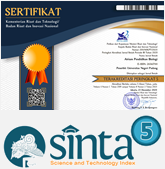The Effect of the Cooperative Learning Model Type of Group Investigation (GI) on Scientific Attitudes and Learning Outcomes in the Excretion System Material of Grade VIII Students of Padang 11 Junior High School
Abstract
This research is based on the problems by science teachers, namely the daily test scores of students, more than 50% of students get scores below the minimum completeness criteria. The purpose of this study is (1) to reveal the presence or absence of differences in learning outcomes between students who are taught using a cooperative learning model type Group Investigation (GI) with students who are taught using conventional learning models, (2) reveal the presence or absence of scientific attitude differences, among students who are taught to use a cooperative learning model type of Group Investigation (GI) with students who are taught using conventional learning models. This research is an experimental study with the research Static Group Comparison Design. The subjects in this study were 8th grade students of the 11th Junior High School in Padang 2018/2019 in 64 students. The research instrument used was in the form of posttest for knowledge competencies, observation sheets for attitude and skills competencies.
The hypothesis in this study was tested using the t ^ test. The results of the t-test are known that in the competency of knowledge t count 2.18> t table 2.04, the competency attitude t count 3.36> t table 2.04, while the competency skills t count 1.40 <t table. This shows that the hypothesis is accepted for knowledge and attitude competencies. So it can be concluded that the application of the Group Investigation learning model can improve student learning competencies in the material of Excretion Systems at Padang 11 Public Middle School with a confidence level of 0.975Keywords
Full Text:
FullpaperReferences
Istikomah, H, Hendratto, S dan Bambang, S. 2010. Penggunaan Model Pembelajaran Group Investigation Untuk Menumbuhkan Sikap Ilmiah Siswa. Jurnal Pendidikan Fisika (6) 40-43.
Kusumawati, D. 2012. Penerapan Model Pembelajaran Kooperatif Tipe Group Investigation (GI) Untuk Meningkatkan Aktivitas Belajar Akuntansi Siswa Kelas X Akuntasnsi 1 SMK Muahammadiayah Wonosari Tahun Ajaran 2012/2013. Padang: Universitas Negeri Padang.
Richvana, A, dan Sri, D dan Baskoro, A. 2012. Pengaruh Model Pembelajaran Group Investigation Terhadap Hasil Belajar Biologi Ditinjau Dari Tingkat Krestivitas Siswa Kelas X SMAN 2 Kaanganyar. FKIP: Universitas Sebelas Maret.
Sadirman. 2010. Interaksi dan Motivasi Belajar Mengajar. Jakarta: Rajawali Press.
Slameto. 2010. Belajar dan Faktor – Faktor yang Mempengaruhinya. Jakarta: Rineka Cipta.
Supriadie, D dan Darmawan, D. 2012. Komunikasi Pembelajaran. Bandung Remaja Rosdakarya.
Winkel, W S. 1999. Psikologi Pengajaran. Jakarta. Grasindo.
DOI: http://dx.doi.org/10.24036/apb.v4i4.6155
DOI (Fullpaper): http://dx.doi.org/10.24036/apb.v4i4.6155.g3611




